八上Unit6 Birdwatching Grammmar 教学课件
文档属性
| 名称 | 八上Unit6 Birdwatching Grammmar 教学课件 | 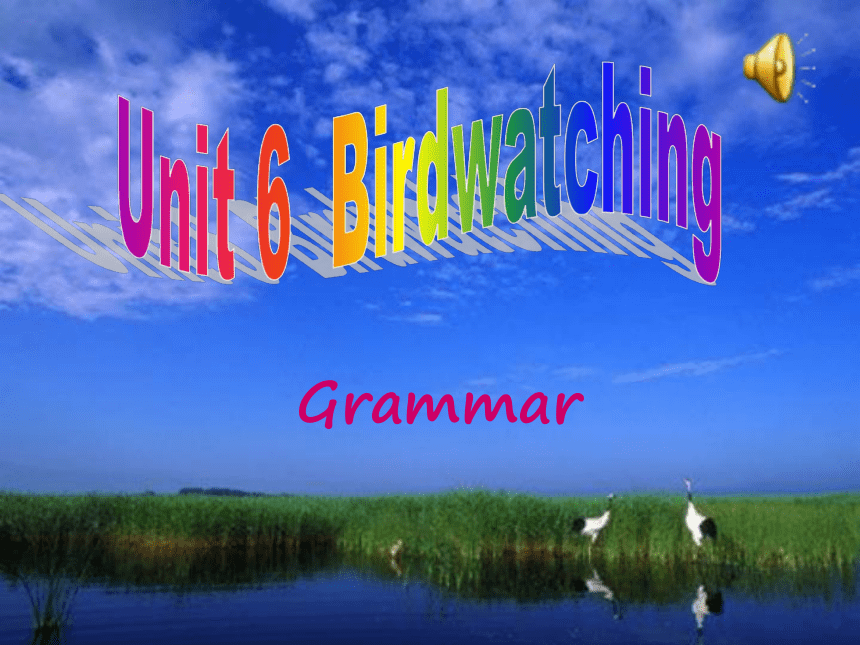 | |
| 格式 | zip | ||
| 文件大小 | 982.9KB | ||
| 资源类型 | 教案 | ||
| 版本资源 | 牛津译林版 | ||
| 科目 | 英语 | ||
| 更新时间 | 2015-12-05 12:23:49 | ||
图片预览

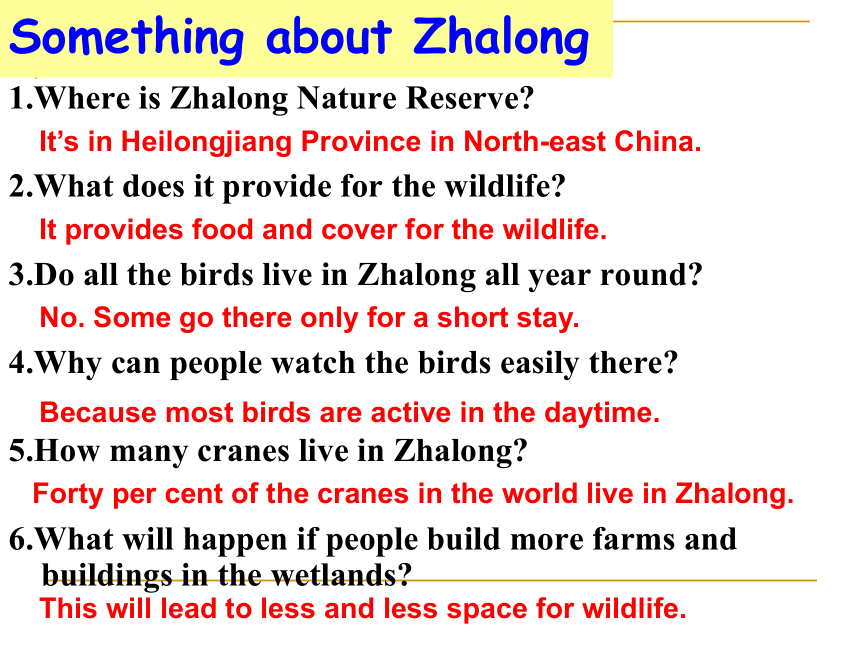
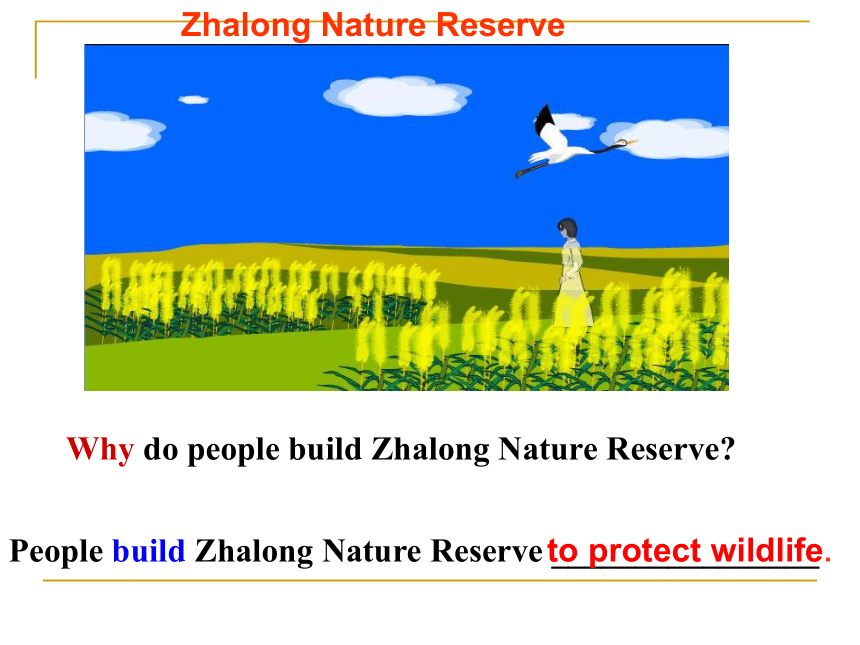
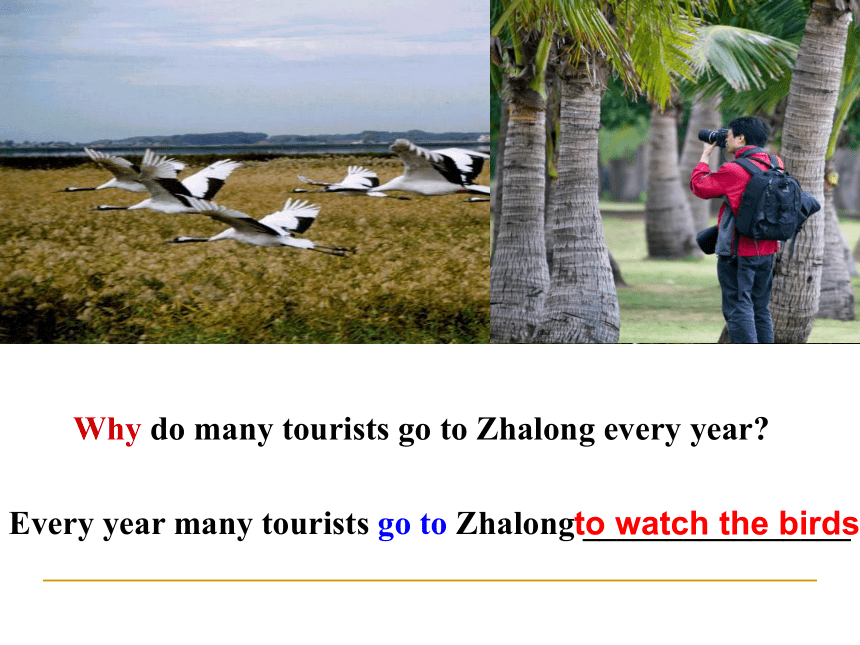
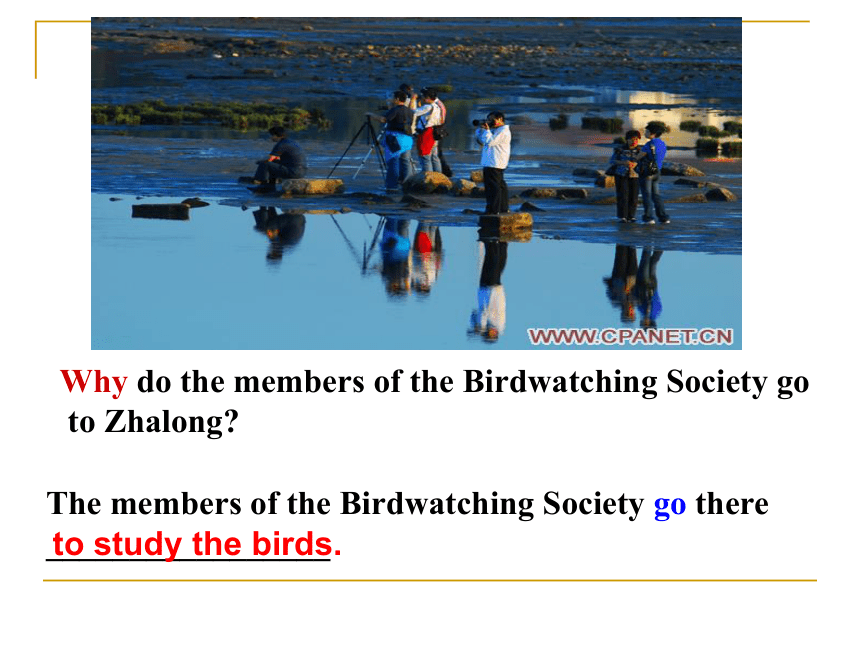

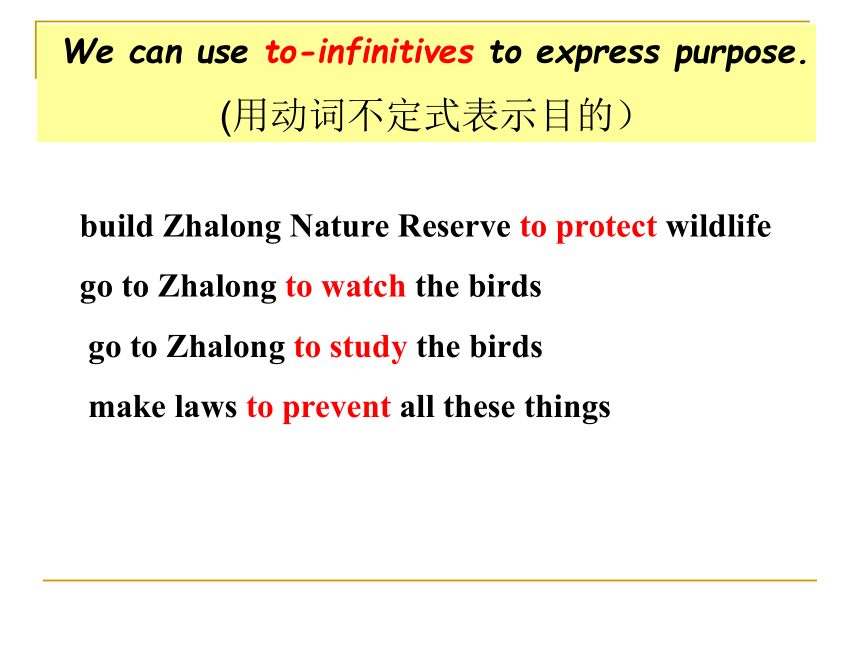
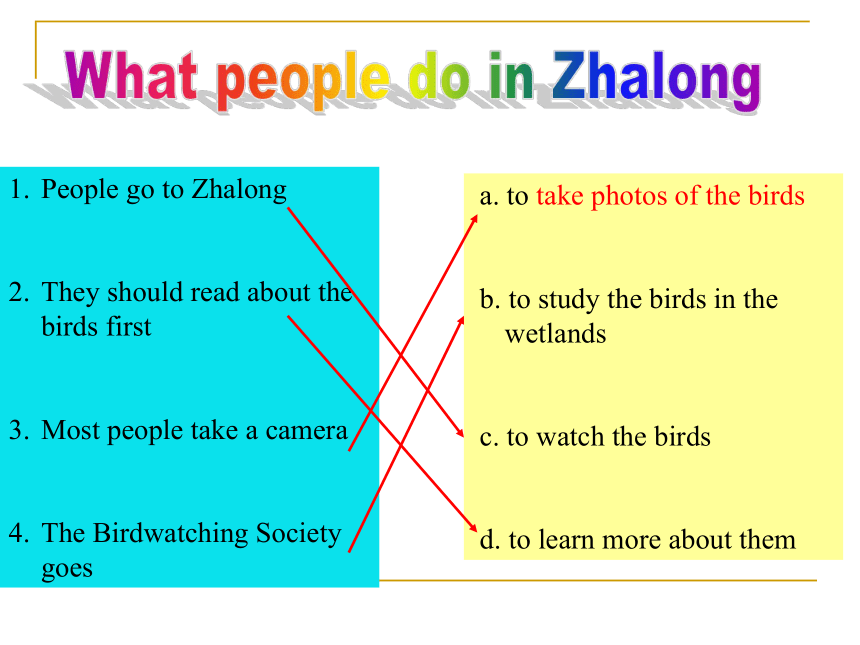
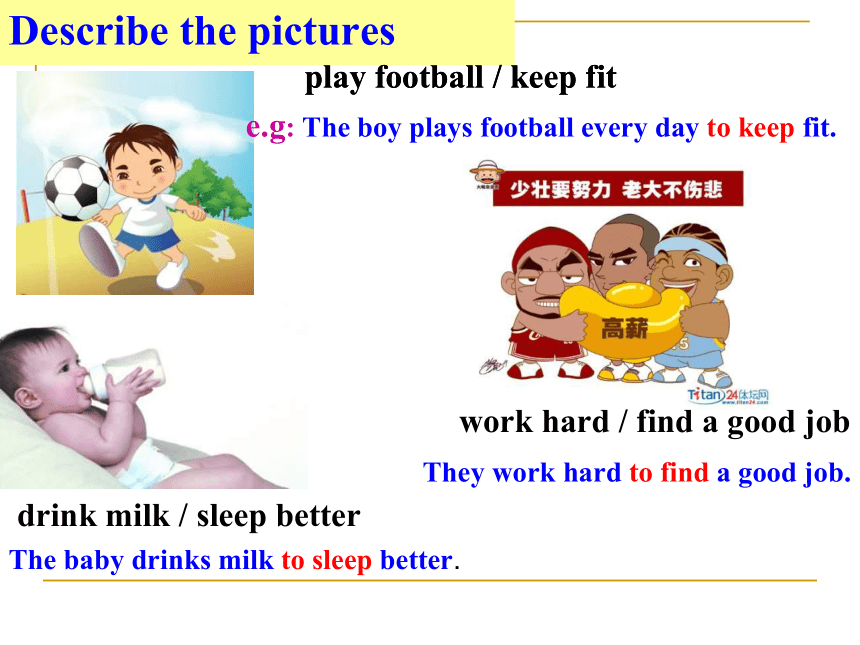
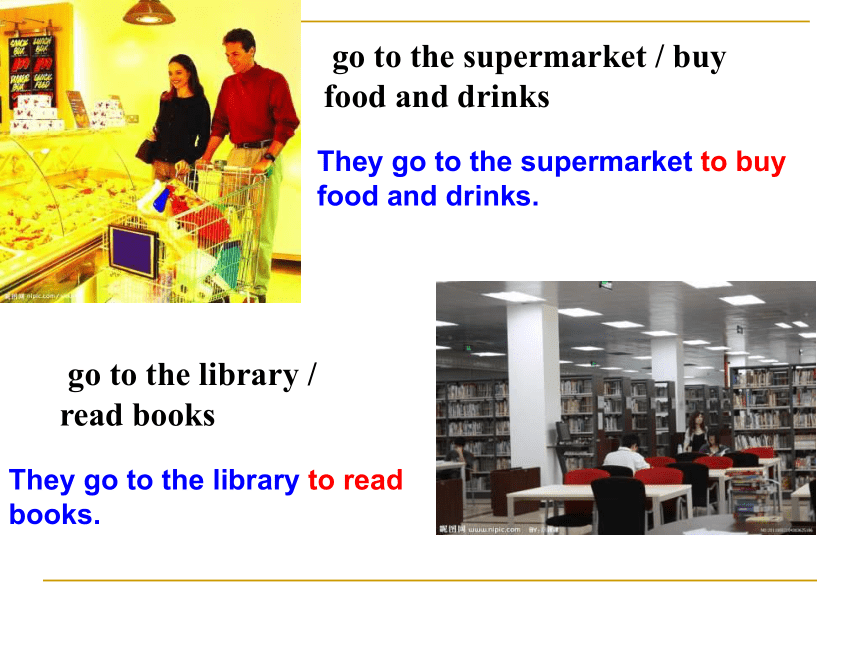
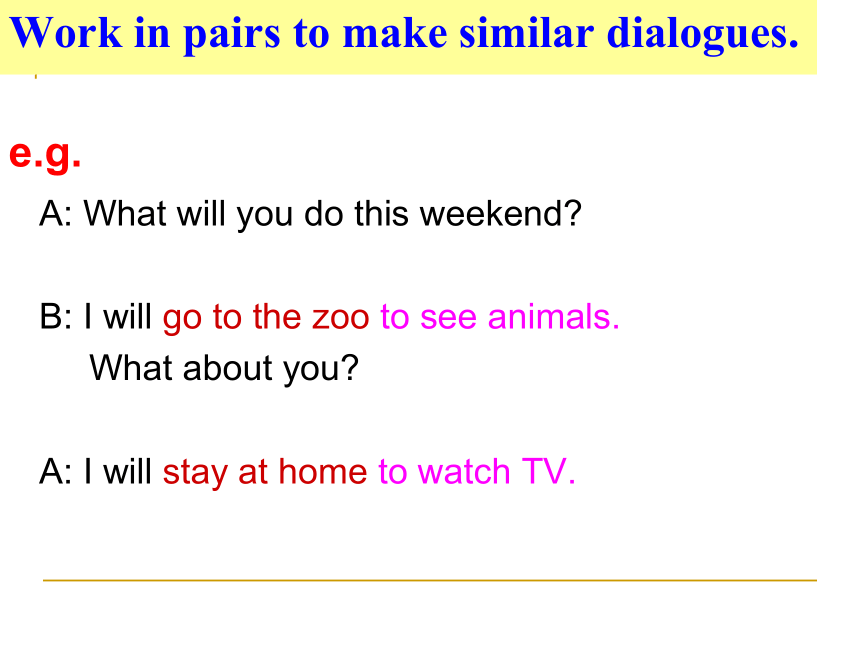
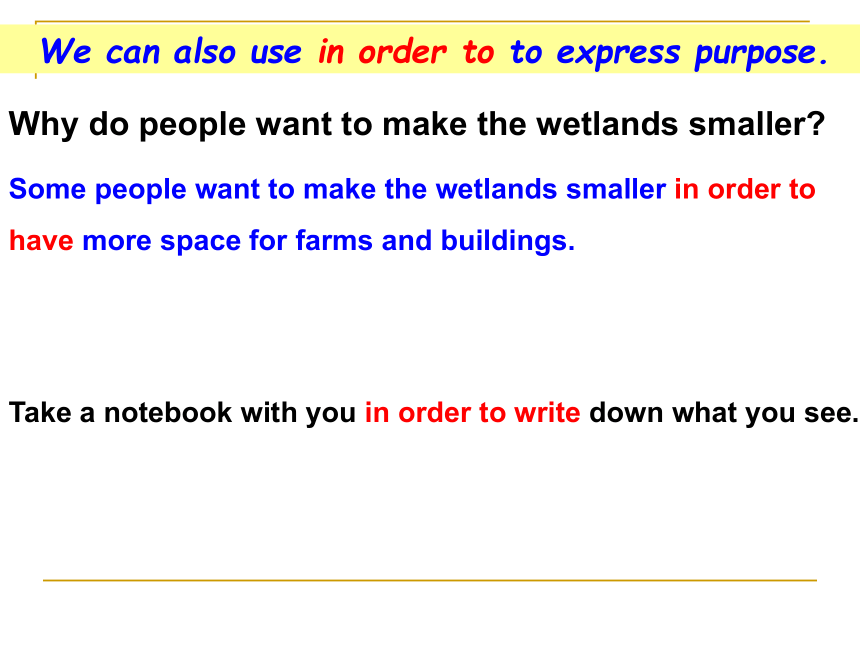
文档简介
课件30张PPT。动词不定式Unit 6 BirdwatchingGrammar Something about Zhalong1.Where is Zhalong Nature Reserve?
2.What does it provide for the wildlife?
3.Do all the birds live in Zhalong all year round?
4.Why can people watch the birds easily there?
5.How many cranes live in Zhalong?
6.What will happen if people build more farms and buildings in the wetlands?
It’s in Heilongjiang Province in North-east China.No. Some go there only for a short stay.It provides food and cover for the wildlife.Because most birds are active in the daytime.Forty per cent of the cranes in the world live in Zhalong.This will lead to less and less space for wildlife.Zhalong Nature ReservePeople build Zhalong Nature Reserve ________________ to protect wildlife.Why do people build Zhalong Nature Reserve?Every year many tourists go to Zhalong ________________ to watch the birdsWhy do many tourists go to Zhalong every year?The members of the Birdwatching Society go there _________________to study the birds.Why do the members of the Birdwatching Society go
to Zhalong? The Chinese government has made laws ___________
all these things in Zhalong.to preventWhy has the Chinese government made laws?build Zhalong Nature Reserve to protect wildlife
go to Zhalong to watch the birds
go to Zhalong to study the birds
make laws to prevent all these things
We can use to-infinitives to express purpose.
(用动词不定式表示目的)What people do in ZhalongPeople go to Zhalong
They should read about the birds first
Most people take a camera
The Birdwatching Society goes a. to take photos of the birds
b. to study the birds in the wetlands
c. to watch the birds
d. to learn more about themDescribe the pictures play football / keep fite.g: The boy plays football every day to keep fit. drink milk / sleep better work hard / find a good job play football / keep fitThe baby drinks milk to sleep better.They work hard to find a good job. go to the supermarket / buy food and drinks go to the library / read booksThey go to the supermarket to buy
food and drinks.They go to the library to read
books.Work in pairs to make similar dialogues.A: What will you do this weekend?
B: I will go to the zoo to see animals.
What about you?
A: I will stay at home to watch TV.e.g.Some people want to make the wetlands smaller in order to
have more space for farms and buildings.
Take a notebook with you in order to write down what you see. We can also use in order to to express purpose. Why do people want to make the wetlands smaller?
We can also use in order to to express purpose. go to Zhalong to watch the birds
go there to study the birds
make laws to protect the birds
take a camera to take photos of the birds
go to Zhalong in order to watch the birds
go there in order to study the birds
make laws in order to protect the birds
take a camera in order to take photos of the birds
He studies hard to get better grades.
He studies hard in order to get better grades.
To get better grades, he studies hard.
In order to get better grades, he studies hard
She often goes to Shanghai to see her parents.
She often goes to Shanghai in order to see her parents.
To see her parents, she often goes to Shanghai.
In order to see her parents, she often goes to shanghai
We can also use in order to to express purpose. put on the coat / keep warmThe girl put on the coat in order to keep warm. put on the coat / not catch a coldThe girl put on the coat in order not to catch a cold. put on the coat / keep warmDescribe the pictures get up early / not be late for school listen carefully in class / not miss anything importantHe gets up early in order not to be late for school.They listen carefully in class in order not
to miss anything important.
e.g.My sister went to the supermarket ……
S1:My sister went to the supermarket to / in order to
buy some food.
S2:My sister went to the supermarket to / in order to
meet her friend.
S3:……play games Group1:The students went to the playground to /
in order to ……
Group2:Lucy got up early to / in order to……
Group3:Mr Wang went to Beijing to / in order to……
Group4:My mother went to the city center to / in order to….
Last month, my family went to Linyi (临沂)Wild Animal Park.to see the animalsBefore we went to the zoo, my friend advised me to buy tickets online.Can you think of some other similar words?She also advised me not to drive to Linyi because of the heavy traffic.
常跟带to的动词不定式作宾语补足语的动词有:ask, tell, order, invite, get, allow, wish, want, encourage, advise, warn, like, love, hate等。In class, the teacher tells us to/not to……
At home, my mother asks me to/not to
In the library, the teacheradvises us to/not to……
Miss wang teaches us to……
Miss Huan encourages us to…
The policeman orders the thief …
Millie invited us to..Group work: discuss in groups and try to give as many answers as you can.Some animal showsI watched a monkey ride a bike.We saw an elephant play football. The zookeeper let dolphins play some tricks.
We saw a tiger jump through rings.I heard many people shout excitedly.3.She saw a baby panda drink her mother’s milk.
4.Millie and Amy heard someone sing in the park. 1.Max tells funny jokes and often makes me laugh.
2.Mr Wu agreed to let me join their school trip.5.This will help people (to) understand the
importance of the wetlands.The Class 1, Grade 8 students went to Zhalong Nature Reserve. Sandy is writing about their trip. Help her complete the sentences with the correct forms of the verbs in brackets.Going birdwatching1. Mr Wu _____ us ________ a pair of comfortable shoes because we would have to walk a long way. (ask/wear)
2. We ______ some birds _____ in the trees. (hear/sing)
3. Mr Wu _____ us _________ the birds carefully. (tell/watch)
4. He also __________ us __________ the birds. (encourage/describe)asked to wearheard singtold to watchencouraged to describe 5. He _______ us __________ in the wetlands. (advise/not shout)
6. The cold weather _______ some birds ______ south for the winter. (make/fly)
7. The trip _______ us ______ more about wildlife. (help/learn)madehelped learnflyadvised not to shout一、句型转换。
1. He went to the library because he wanted to borrow some books.(改为同义句)
He went to the library__ ____ ___ ______ some books.
2. She often goes to Shanghai to see her parents.
(对划线部分提问)
__________________________________Why does she often go to Shanghai?in order to borrowPractice我们去公园散步。
她买了这本书给我作生日礼物。
我们应该采取行动来帮助野生动物。
我经常去市场看鸟。
5. 随身带本笔记本记下你所看到的东西。We go to the park to walk.She bought the book to give me as a birthday present.We should take action to help wildlife.I often go to the market to watch birds.Take a notebook with you to write down what you see.Practice二、翻译句子。Homework1.Make sentences using to-infinitives for purpose.
2.Preview Grammar BThank you!
2.What does it provide for the wildlife?
3.Do all the birds live in Zhalong all year round?
4.Why can people watch the birds easily there?
5.How many cranes live in Zhalong?
6.What will happen if people build more farms and buildings in the wetlands?
It’s in Heilongjiang Province in North-east China.No. Some go there only for a short stay.It provides food and cover for the wildlife.Because most birds are active in the daytime.Forty per cent of the cranes in the world live in Zhalong.This will lead to less and less space for wildlife.Zhalong Nature ReservePeople build Zhalong Nature Reserve ________________ to protect wildlife.Why do people build Zhalong Nature Reserve?Every year many tourists go to Zhalong ________________ to watch the birdsWhy do many tourists go to Zhalong every year?The members of the Birdwatching Society go there _________________to study the birds.Why do the members of the Birdwatching Society go
to Zhalong? The Chinese government has made laws ___________
all these things in Zhalong.to preventWhy has the Chinese government made laws?build Zhalong Nature Reserve to protect wildlife
go to Zhalong to watch the birds
go to Zhalong to study the birds
make laws to prevent all these things
We can use to-infinitives to express purpose.
(用动词不定式表示目的)What people do in ZhalongPeople go to Zhalong
They should read about the birds first
Most people take a camera
The Birdwatching Society goes a. to take photos of the birds
b. to study the birds in the wetlands
c. to watch the birds
d. to learn more about themDescribe the pictures play football / keep fite.g: The boy plays football every day to keep fit. drink milk / sleep better work hard / find a good job play football / keep fitThe baby drinks milk to sleep better.They work hard to find a good job. go to the supermarket / buy food and drinks go to the library / read booksThey go to the supermarket to buy
food and drinks.They go to the library to read
books.Work in pairs to make similar dialogues.A: What will you do this weekend?
B: I will go to the zoo to see animals.
What about you?
A: I will stay at home to watch TV.e.g.Some people want to make the wetlands smaller in order to
have more space for farms and buildings.
Take a notebook with you in order to write down what you see. We can also use in order to to express purpose. Why do people want to make the wetlands smaller?
We can also use in order to to express purpose. go to Zhalong to watch the birds
go there to study the birds
make laws to protect the birds
take a camera to take photos of the birds
go to Zhalong in order to watch the birds
go there in order to study the birds
make laws in order to protect the birds
take a camera in order to take photos of the birds
He studies hard to get better grades.
He studies hard in order to get better grades.
To get better grades, he studies hard.
In order to get better grades, he studies hard
She often goes to Shanghai to see her parents.
She often goes to Shanghai in order to see her parents.
To see her parents, she often goes to Shanghai.
In order to see her parents, she often goes to shanghai
We can also use in order to to express purpose. put on the coat / keep warmThe girl put on the coat in order to keep warm. put on the coat / not catch a coldThe girl put on the coat in order not to catch a cold. put on the coat / keep warmDescribe the pictures get up early / not be late for school listen carefully in class / not miss anything importantHe gets up early in order not to be late for school.They listen carefully in class in order not
to miss anything important.
e.g.My sister went to the supermarket ……
S1:My sister went to the supermarket to / in order to
buy some food.
S2:My sister went to the supermarket to / in order to
meet her friend.
S3:……play games Group1:The students went to the playground to /
in order to ……
Group2:Lucy got up early to / in order to……
Group3:Mr Wang went to Beijing to / in order to……
Group4:My mother went to the city center to / in order to….
Last month, my family went to Linyi (临沂)Wild Animal Park.to see the animalsBefore we went to the zoo, my friend advised me to buy tickets online.Can you think of some other similar words?She also advised me not to drive to Linyi because of the heavy traffic.
常跟带to的动词不定式作宾语补足语的动词有:ask, tell, order, invite, get, allow, wish, want, encourage, advise, warn, like, love, hate等。In class, the teacher tells us to/not to……
At home, my mother asks me to/not to
In the library, the teacheradvises us to/not to……
Miss wang teaches us to……
Miss Huan encourages us to…
The policeman orders the thief …
Millie invited us to..Group work: discuss in groups and try to give as many answers as you can.Some animal showsI watched a monkey ride a bike.We saw an elephant play football. The zookeeper let dolphins play some tricks.
We saw a tiger jump through rings.I heard many people shout excitedly.3.She saw a baby panda drink her mother’s milk.
4.Millie and Amy heard someone sing in the park. 1.Max tells funny jokes and often makes me laugh.
2.Mr Wu agreed to let me join their school trip.5.This will help people (to) understand the
importance of the wetlands.The Class 1, Grade 8 students went to Zhalong Nature Reserve. Sandy is writing about their trip. Help her complete the sentences with the correct forms of the verbs in brackets.Going birdwatching1. Mr Wu _____ us ________ a pair of comfortable shoes because we would have to walk a long way. (ask/wear)
2. We ______ some birds _____ in the trees. (hear/sing)
3. Mr Wu _____ us _________ the birds carefully. (tell/watch)
4. He also __________ us __________ the birds. (encourage/describe)asked to wearheard singtold to watchencouraged to describe 5. He _______ us __________ in the wetlands. (advise/not shout)
6. The cold weather _______ some birds ______ south for the winter. (make/fly)
7. The trip _______ us ______ more about wildlife. (help/learn)madehelped learnflyadvised not to shout一、句型转换。
1. He went to the library because he wanted to borrow some books.(改为同义句)
He went to the library__ ____ ___ ______ some books.
2. She often goes to Shanghai to see her parents.
(对划线部分提问)
__________________________________Why does she often go to Shanghai?in order to borrowPractice我们去公园散步。
她买了这本书给我作生日礼物。
我们应该采取行动来帮助野生动物。
我经常去市场看鸟。
5. 随身带本笔记本记下你所看到的东西。We go to the park to walk.She bought the book to give me as a birthday present.We should take action to help wildlife.I often go to the market to watch birds.Take a notebook with you to write down what you see.Practice二、翻译句子。Homework1.Make sentences using to-infinitives for purpose.
2.Preview Grammar BThank you!
同课章节目录
